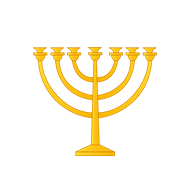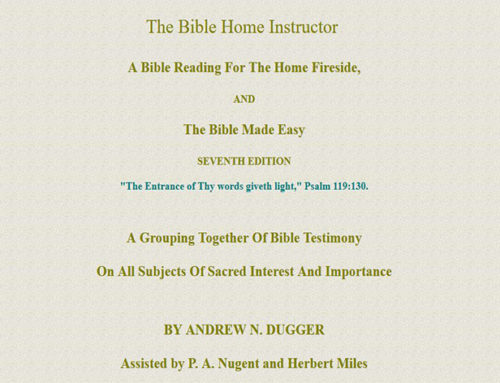1. Will Christ’s people be in darkness regarding His coming, so that He will come upon them at an unexpected time as a thief in the night?
“But ye brethren are not in darkness, that that day should overtake you as a thief. Ye are all the children of light and the children of the day; we are not of the night nor of darkness,” I Thessalonians 5:4, 5.
2. As we are plainly informed by the sacred word that Christ’s brethren will not be in darkness regarding the time of His coming, what does the Bible say of the wicked?
“But the wicked shall do wickedly, and none of the wicked shall understand, but the wise shall understand,” Daniel 12:10.
3. What does the Bible further tell us of how Christ will come upon the hypocrite, and all who will be cut asunder?
“The . . . Lord of that servant shall come in a day when he looketh not for Him, and in an hour that he is not aware of, and shall cut him asunder and appoint him his portion with the hypocrites: There shall be weeping and gnashing of teeth,” Matthew 24:50, 51.
4. Have we any admonition in the Word to watch, that Christ will not come upon us as a thief?
“If therefore thou shalt not watch, I will come on thee as a thief, and if thou shalt not know what hour I will come upon thee,” Revelation 3:3.
5. As God has repeatedly given His people instructions to watch, with the promise that they will not be in darkness regarding this important event of the return of Jesus, what has He given us to watch?
“We have also a more sure word of prophecy; whereunto ye do well that ye take heed as unto a light that shineth in a dark place, until the day dawn, and the day star arise in your hearts,” II Peter 1:19.
6. After Christ had given a series of events that would transpire in the world before His coming, what figure for illustration did He give, to impress upon them how simple and plain, the signs in the world would be, that His coming was near?
“Now learn a parable of the fig tree, when his branch is yet tender, and putteth forth leaves, ye know that summer is nigh; So likewise, ye, when we shall see all these things, know that it is near, even at the door,” Matthew 24:32, 33.
7. What warning does Christ give His people lest there be danger of His coming upon them unawares?
“And take heed to yourselves, lest at any time your hearts be overcharged with surfeiting, and drunkenness and cares of this life, and so that day come upon you unawares,” Luke 21:34.
8. What other sign was to mark His advent?
“There shall come a Star out of Jacob and a Scepter shall rise out of Israel,” Numbers 24:17.
9. To whom did this star appear?
“There came wise men from the east to Jerusalem, saying, Where is He that is born King of the Jews? for we have seen His star in the east, and are come to worship Him . . . . And lo, the star, which they saw in the east, went before them, till it came and stood over where the young child was,” Matthew 2:1, 2, 9.
10. What was predicted of the little children in connection with the birth of Christ?
“A voice was heard in Ramah, lamentation, and bitter weeping; Rachel weeping for her children refused to be comforted for her children, because they were not,” Jeremiah 31:15.
11. How were these words of the prophet verified?
“Then Herod, when he saw that he was mocked of the wise men, was exceeding wroth, and sent forth, and slew all the children that were in Bethlehem, and . . . in all the coasts thereof, from two years old and under, according to the time which he had diligently inquired of the wise men. Then was fulfilled that which was spoken by Jeremy the prophet, saying, In Rama there was a voice heard, lamentation, and weeping, and great mourning, Rachel weeping for her children, and would not be comforted, because they were not,” Matthew 2:16-18.
12. How was He to be received by His own people?
“He is despised and rejected of men; a man of sorrows, and acquainted with grief: and we hid as it were our faces from Him; He was despised, and we esteemed Him not,” Isaiah 53:3.
13. Did this prophecy prove true?
“He was in the world, and the world was made by Him, and the world knew Him not. He came unto His own, and His own received Him not,” John 1:10, 11.
14. What was predicted of His preaching?
“The Spirit of the Lord God is upon Me; because the Lord hath anointed Me to preach good tidings unto the meek; He hath sent Me to bind up the brokenhearted, to proclaim liberty to the captives, and the opening of the prison to them that are bound,” Isaiah 61:1.
15. In what way was this prediction verified?
“And He came to Nazareth, where He had been brought up; and, as His custom was, He went into the synagogue on the Sabbath day, and stood up for to read. And there was delivered unto Him the book of the prophet Esaias. And when He had opened the book, He found the place where it was written, The Spirit of the Lord is upon Me, because He hath anointed Me to preach the gospel to the poor: He hath sent Me to heal the broken-hearted, to preach deliverance to the captives, and recovering of sight to the blind, to set at liberty them that are bruised . . . And He began to say unto them, This day is this scripture fulfilled in your ears,” Luke 4:16-21.
16. How was it said He would do when on trial?
“He was oppressed, and he was afflicted, yet He opened not His mouth; He is brought as a lamb to the slaughter, and as a sheep before her shearers is dumb, so He opened not His mouth,” Isaiah 53:7.
17. When accused by His enemies before Pilate, how did Christ receive their words?
“Then said Pilate unto Him, Hearest Thou not how many things they witness against Thee? And He answered him never a word; insomuch that the governor marveled greatly,” Matthew 27:13, 14.
18. How did the prophecy state that Christ’s murderers would dispose of His garments?
“They part my garments among them, and cast lots upon My vesture,” Psalms 22:18.
19. Was this literally accomplished?
“And they crucified Him, and parted His garment, casting lots: that it might be fulfilled which was spoken by the prophet, They parted My garments among them, and upon My vesture did they cast lots,” Matthew 27:35.
20. How was it said they would treat Him while on the cross?
“They gave me also gall for My meat; and in My thirst they gave Me vinegar to drink,” Psalms 69:21.
21. What was offered Him when in His dying agony?
“They gave Him vinegar to drink mingled with gall: and when He had tasted thereof, He would not drink,” Matthew 27:34.
22. Where was the grave of Christ to be made?
“And He made His grave with the wicked, and with the rich in His death,” Isaiah 53:9.
23. What was actually done with His body, after it was taken down from the cross?
“A rich man of Arimathea, named Joseph . . . went to Pilate, and begged the body of Jesus . . . He wrapped it in a clean linen cloth, and laid it in his own new tomb which he had hewn out in the rock,” Matthew 27:57-60.


Leave A Comment